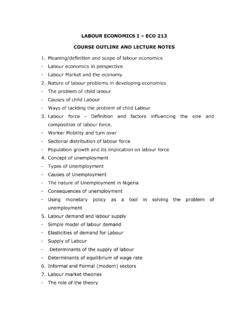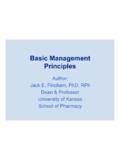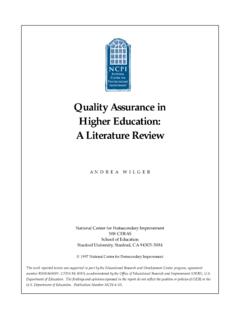Transcription of ANALYTICAL MICROBIOLOGY QUALITY CONTROL IN …
1 ANALYTICAL MICROBIOLOGY QUALITY CONTROL IN MICROBIOLOGICAL LABORATORY specification and regulations and international approaches to obtaining safe food and QUALITY assurance in the MICROBIOLOGY laboratory Lecturer: Miss Elemba, O. M. Microbiological specification and regulations Microbiological Criteria: Microbiological criteria are used at any stage in the food chain to assess the acceptance of lots of raw material or finished product. They are based on the absence / presence of certain microorganisms or quantitative limits of these microorganisms, per unit(s) of mass, volume, area or lot.
2 Three types of Microbiological criteria 1. Microbiological Standards: Mandatory microbiological criteria which are written into law or government regulations and specified by government to protect public health 2. Microbiological Guidelines: Microbiological criteria which provide advice to food manufacturers about acceptable or expected microbial levels when the food production process is under CONTROL when applying best practices. 3. Microbiological Specifications: Microbiological criteria established between buyers and producers that define product QUALITY and safety attributes required by the buyer.
3 A detailed description of requirements Why do we use microbiological criteria/specifications? Regulatory agencies and industrial assurance personnel regularly examine foods or ingredients for microorganisms or their metabolic products that may indicate presence of a pathogen or harmful toxin possibility that faulty practices occurred during production, processing, storage and distribution suitability of a food or ingredient for a desired purpose. Setting goals for public health is the right and responsibility of governments. These goals may specify the maximum number of harmful bacteria that may be present in a food.
4 Where possible, the determination of this number should be based on scientific and societal factors. Costs may include industry costs for reformulation and changes in processing, consumer costs due to increased prices, or reduced availability of certain products, and regulatory costs in terms of surveillance. Bodies with roles to play in food safety Government bodies (a). The Federal Ministry of Health (FMOH) The Federal Ministry of Health is responsible for the formulation of national policies, guidelines and regulations on food safety including monitoring and evaluation.
5 It is also responsible for the assessment of the nutritive value of food, environmental sanitation, food environment and handlers, CONTROL of food borne disease, QUALITY of public water from taps, as well as national and international matters relating to food. (b) The National Agency For Food And Drug Administration and CONTROL (NAFDAC) NAFDAC is responsible for the regulation and CONTROL of the importation, exportation, manufacture, advertisement, distribution, sale and use of food, drug, cosmetics, medical devices, chemicals, packaged water and detergent at Federal and State levels in Nigeria.
6 Appropriate tests are conducted and compliance with standard specifications for the effective CONTROL of the QUALITY of food, bottled water and the raw materials as well as their production processes in factories and other establishments is ensured. The Agency undertakes appropriate investigations into production premises and raw materials for food and establishes relevant QUALITY assurance systems including certification of the production sites and the regulated products and pronounces on the QUALITY and safety of food, bottled water and chemicals. The role of the Agency also includes the inspection of imported food facilities to ascertain relevant QUALITY assurance systems necessary for certification of the imported food product.
7 Standards Organization of Nigeria (SON) The Standards Organisation of Nigeria is responsible for the formulation and enforcement of set standards on the composition of imported and locally manufactured food. responsible for investigating the QUALITY of facilities, materials and products in Nigeria. They also establish a QUALITY assurance system, including certification of factories, products and laboratories and to promote consumer confidence and global competitiveness of Nigerian products and services through standardisation and QUALITY assurance The mandate of the Organisation includes preparation of Standards relating products, measurements, materials, processes and services amongst others and their promotion at National, Regional and International levels; certification of products, assistance in the production of QUALITY goods and services.
8 improvement of measurement accuracies and circulation of information relating to standards The Federal Ministry of Agriculture and Rural Development (FMA&RD) The Federal Ministry of Agriculture and Rural Development is responsible for formulating policies on primary agricultural production and practices which cover plants, animals, pests and diseases etc.; supervising and overseeing its departments and parastatals research institutes, colleges of agriculture, colleges of fisheries etc. Regulatory strategies USED BY NAFDAC The National Agency for Food & Drug Administration & CONTROL (NAFDAC) is the regulatory authority in Nigeria with the mandate to regulate and CONTROL the manufacture, importation, exportation, advertisement, distribution, sale and use of food, drug, cosmetics, medical devices, chemicals, detergents and packaged water often referred to as regulated products.
9 NAFDAC is the lead Agency for food safety and QUALITY . Regulatory strategies Registration : The product registration process is one of the regulatory strategies of NAFDAC. The Agency uses product registration to establish and monitor the ownership and/or distributorship of the products it regulates, generally known as regulated products ( food, drug, cosmetics, medical devices, chemicals, detergents and packaged water); their safety; QUALITY ; labelling; claims etc. NAFDAC employs a structured and systematic Regulation and Enforcement of Legislation on Food Safety in Nigeria at the end of which the product is assigned a NAFDAC Registration Number which is an attestation to the safety, QUALITY and appropriateness for its intended use.
10 The registration process involves: : Documents are required such as: Power of Attorney from the manufacturer authorizing an applicant to speak for his principal on all matters relating to the latter s specialties; Certificate of Manufacture and Free Sale which is an evidence that the product is manufactured and freely sold in the country of origin; Certificate of Incorporation of the representative company in Nigeria; Evidence of Trade Mark registration; Comprehensive Certificate of Analysis of the batch of product to be registered. The permit to import samples for registration purposes is issued if documentation is satisfactory.









